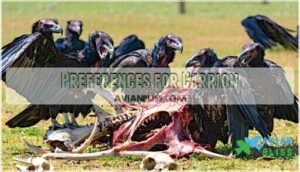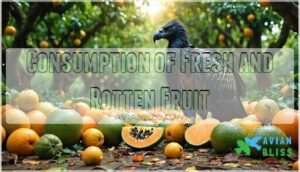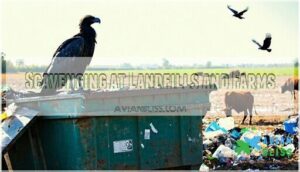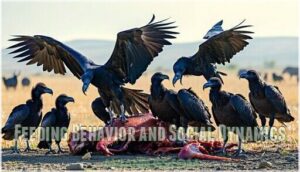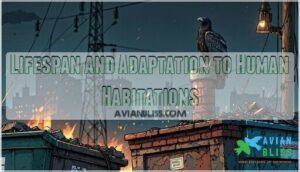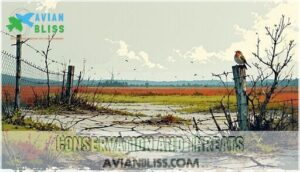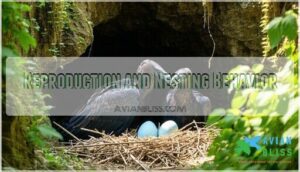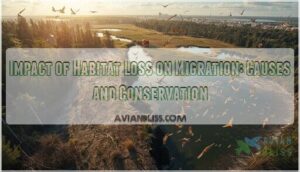This site is supported by our readers. We may earn a commission, at no cost to you, if you purchase through links.
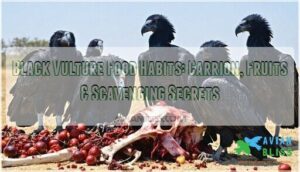
You’ll find them feasting primarily on dead animals, from roadkill to livestock carcasses.
They’re opportunistic scavengers who’ll also consume rotting fruit, garbage, and occasionally prey on eggs or vulnerable newborns.
Unlike turkey vultures, black vultures lack a strong sense of smell, so they follow their keen-nosed cousins to locate meals.
They’re social feeders, often gathering in groups around large carcasses, and their powerful beaks tear through tough hide and bone with surprising efficiency.
These feeding patterns reveal fascinating social hierarchies and survival strategies.
Table Of Contents
- Key Takeaways
- Black Vulture Diet Overview
- Preferences for Carrion
- Consumption of Fresh and Rotten Fruit
- Scavenging at Landfills and Farms
- Feeding Behavior and Social Dynamics
- Carrion Handling Behavior
- Hunting and Feeding Techniques
- Lifespan and Adaptation to Human Habitations
- Conservation and Threats
- Reproduction and Nesting Behavior
- Frequently Asked Questions (FAQs)
- Can a vulture pick up a 20 pound dog?
- What is vultures’ favorite food?
- What do black vultures like to eat?
- Are black vultures aggressive?
- What is vultures favorite food?
- What time of year do black vultures nest?
- Do black vultures eat insects other than maggots?
- How much food can a black vulture consume daily?
- Can black vultures digest bones from their prey?
- Do black vultures ever hunt cooperatively in groups?
- Conclusion
Key Takeaways
- You’ll find black vultures are primarily scavengers – they consume up to 97% carrion in wild areas, focusing on large mammal carcasses like cattle and deer rather than hunting live prey.
- You can spot them following turkey vultures to food sources – since black vultures lack strong smell capabilities, they rely on their keen eyesight and social intelligence to locate meals by monitoring other scavengers.
- You’ll discover they’re surprisingly diverse eaters – beyond carrion, they consume rotting fruits (up to 19% of their diet seasonally), scavenge at landfills and farms, and even eat eggs and agricultural waste.
- You’ll witness aggressive group feeding behaviors – they establish dominance hierarchies at carcasses, often displacing turkey vultures and crows through coordinated attacks and sheer numbers.
Black Vulture Diet Overview
You’ll find that black vulture diet represents nature’s most efficient recycling system.
These adaptable scavengers don’t limit themselves to just carrion consumption—their dietary adaptations include everything from rotting carcasses to fresh fruits and human waste.
Black vulture carrion preferences focus on large mammals like cattle and deer, but their vulture food sources extend far beyond dead animals.
They’ll consume maggot-infested flesh, raid chicken farms for discarded poultry, and dig up sea turtle eggs for protein.
Fruit consumption provides essential nutrients, with these birds eating both fresh berries and overripe melons.
Waste scavenging at landfills and farms showcases their resourcefulness.
They’ll eat kitchen scraps, agricultural waste, and even non-food items accidentally.
This vulture feeding ecology demonstrates remarkable flexibility—up to 97% carrion in wild areas, but increased diversity near human settlements.
Their sooty black plumage distinguishes them from other vultures.
Social feeding behaviors help them locate food efficiently, following other vultures to promising sites.
Their carrion preference combined with opportunistic feeding makes them essential ecosystem cleaners, preventing disease spread while maintaining environmental balance.
Preferences for Carrion
Black vultures have clear preferences regarding carrion consumption. You’ll notice they gravitate toward larger carcasses like cows, horses, and deer rather than smaller prey.
This isn’t just about meal size—it’s smart strategy. Bigger carcasses mean multiple feeding opportunities over several days, maximizing their energy investment.
Carcass size directly impacts their feeding efficiency. Groups can return to the same large carcass repeatedly, establishing temporary feeding territories.
Their rotting tolerance is remarkable—they’ll consume decomposed, fresh, and maggot-infested flesh without issue. Unlike turkey vultures, black vultures lack a highly developed sense of smell, so they prefer fresher carrion they can spot visually.
Carrion competition is fierce. Black vultures are especially aggressive feeders, often displacing turkey vultures and crows at carcasses.
They’ll monitor other scavengers to locate food sources, then muscle their way in through sheer numbers and determination.
Their black vulture diet adapts based on carcass location—whether it’s roadkill, livestock remains, or native wildlife carcasses in wild areas.
To support local bird populations, consider sustainable bird feeding practices.
Consumption of Fresh and Rotten Fruit
While carrion remains their primary sustenance, vulture food habits reveal a surprising dietary twist: fruit consumption plays a significant role in black vulture food habits.
These adaptable birds actively seek both fresh and rotting fruit across their range.
Seasonal Fruit Choices heavily influence their feeding patterns. During peak fruiting seasons, fruit can represent up to 19% of stomach contents, with vultures showing clear Fruit vs Carrion preferences based on availability.
You’ll find them targeting fallen bananas, papayas, and figs in tropical regions.
Interestingly, vulture food preferences lean toward decomposing fruit over fresh varieties. Studies show 70% of feeding events involve rotten fruit, likely due to enhanced odor cues and softer textures that align with their scavenging nature.
Knowing that berries offer antioxidants, it’s possible vultures also benefit nutritionally from these compounds when consuming fruits.
Fruit Sourcing Locations include orchards, agricultural zones, and wild fruiting trees.
While Digestive Adaptations aren’t specialized for frugivory, vultures successfully process various fruit types.
Fruit Nutritional Value provides essential carbohydrates and vitamins, though protein-rich carrion remains essential for breeding females’ reproductive success.
Scavenging at Landfills and Farms
Picture yourself watching nature’s most efficient cleanup crew at work. Black vultures have mastered the art of scavenging at landfills and farms, turning human waste into survival opportunities.
Nature’s ultimate recyclers turn our trash into treasure, one scrap at a time.
These adaptable birds frequent waste management sites where up to 60% of their foraging occurs in some regions, especially during winter months when natural carrion becomes scarce. Urban adaptation has transformed how black vultures interact with human environments.
They’ve learned to navigate dumpsters and farm operations with remarkable efficiency. At livestock facilities, they clean up agricultural waste, placenta from birthing seasons, and animal carcasses that could otherwise pose disease control challenges. One key to protecting vulnerable bird populations is limiting predator access.
Their farm impact extends beyond simple cleanup:
- Reducing organic waste accumulation that breeds harmful bacteria
- Preventing pathogen spread through rapid carcass removal
- Managing livestock remains during calving and birthing seasons
- Consuming discarded feed and poultry scraps
This human interaction creates complex relationships where vultures provide essential waste disposal services while occasionally causing conflicts with farmers over weakened animals.
Feeding Behavior and Social Dynamics
You’ll witness something remarkable when observing black vulture feeding behavior and social dynamics.
These birds don’t scavenge alone – they’ve mastered cooperative foraging through sophisticated information sharing networks.
Dominance hierarchies determine feeding order, with larger birds claiming prime positions while juveniles wait their turn.
Their communal roosts function as strategy centers where following vultures becomes essential for locating food sources.
Vultures also exhibit displacement behaviors when competing for resources.
- Aggressive scavenging tactics help them outcompete turkey vultures and other scavengers at carcasses.
This vulture scavenging habits system creates efficient foraging groups that can quickly overwhelm feeding sites through coordinated attacks.
Carrion Handling Behavior
When you spot a black vulture at work, it’s like watching nature’s cleanup crew spring into action.
These scavengers excel at carcass dominance, quickly establishing control over their find through aggressive wing-spreading and coordinated group harassment.
Their carcass opening strategy targets soft entry points first – eyes, mouth, and anus – using powerful beaks for tearing flesh through tough hides.
Black vultures demonstrate remarkable vulture feeding behavior by consuming carcasses systematically.
They start with softer tissues and organs before progressing to muscle.
Maggot consumption occurs naturally as they strip flesh, providing additional protein.
While they don’t typically engage in bone consumption like some scavengers, they efficiently reduce carcasses to skeletal remains.
They also exhibit social interactions feeding, especially around larger carcasses.
Social hierarchies determine feeding order, with dominant adults accessing prime portions first.
Black vulture scavenging involves cooperative tactics where multiple birds work together opening large carcasses.
Their resistant digestive systems handle decomposed matter safely, though regurgitation behavior may occur when threatened at feeding sites.
Hunting and Feeding Techniques
While visual hunting stands as black vultures’ primary advantage, their sophisticated prey detection abilities extend far beyond simple sight.
You’ll find these birds scanning landscapes from considerable heights, using their exceptional eyesight to identify potential meals across vast territories.
Their vulture feeding behavior involves systematic aerial surveillance, maintaining flight patterns that maximize coverage while conserving energy.
Cooperative foraging defines their most successful hunting strategy.
Black vultures monitor turkey vultures, which possess superior smell capabilities, then follow them to hidden carcasses.
This partnership demonstrates advanced vulture foraging ecology where different species complement each other’s strengths.
Some species display unique cooperative feeding behaviors.
When food sources appear, feeding aggression becomes evident.
Black vultures establish carcass dominance through:
- Aggressive displacement of competing scavengers, including turkey vultures and crows
- Group mobbing tactics that overwhelm solitary competitors at feeding sites
- Hierarchical feeding patterns where dominant birds access choice tissue first
Their black vulture prey acquisition involves powerful bills that tear through tough hides efficiently.
Vulture feeding patterns show preference for soft internal organs, maximizing nutritional intake.
Black vulture scavenging success relies on this combination of visual acuity, social coordination, and competitive aggression.
Lifespan and Adaptation to Human Habitations
Black vultures consistently demonstrate remarkable Urban Adaptation and Habitat Expansion, thriving in environments where most wildlife struggles.
These opportunistic feeders can live up to 25 years in the wild, though most survive 10-15 years due to environmental hazards like vehicle strikes and power lines.
Their success stems from incredible digestive adaptations that neutralize harmful pathogens, making them nature’s cleanup crew in human habitations.
You’ll find them roosting on cell towers, nesting in abandoned buildings, and scavenging at landfills with remarkable efficiency.
One key to their success is their strong immune systems, which allows them to consume rotting meat without ill effects.
| Wild Lifespan | Captive Lifespan |
|---|---|
| 10-25 years | Up to 30 years |
| Average: 15 years | Average: 22 years |
| Oldest recorded: 16 years | Enhanced medical care |
| Environmental risks | Protected environment |
Their Coexistence Strategies include exploiting human waste streams while avoiding direct conflict.
This Human Impact has actually expanded their range northward, with populations thriving near urban centers where consistent food sources and shelter create ideal conditions.
These Lifespan Factors combine to make black vultures one of our most successful urban wildlife adapters.
Conservation and Threats
While you marvel at black vultures’ impressive adaptations to human environments, these avian scavengers face mounting conservation challenges.
Habitat loss from urban development shrinks their natural territories, forcing carrion feeders into closer contact with humans. Poisoning risks emerge when they consume contaminated carcasses containing pesticides or veterinary drugs. Human persecution continues despite their essential disease mitigation role in ecosystems.
Climate change compounds these threats by altering food availability and nesting conditions. Habitat destruction exacerbates these existing problems.
Conservation efforts focus on:
- Protecting critical roosting sites from development and disturbance
- Reducing chemical contamination through safer farming practices
- Education programs that highlight their ecological importance as scavenging birds.
You can support these conservation initiatives by understanding their food habits and appreciating their environmental services.
Reproduction and Nesting Behavior
These avian scavengers follow fascinating reproductive patterns that complement their role as nature’s cleanup crew.
Black vultures reach sexual maturity between 3-5 years old and form monogamous partnerships that often last for life.
Their breeding season typically occurs from February through July, with peak activity in spring months. Unlike many carrion feeders, black vultures don’t construct elaborate structures for reproduction.
Instead, they choose diverse nesting locations including hollow logs, abandoned buildings, dense brush, cliff crevices, and even cave entrances. This flexibility gives them a survival advantage in various environments.
During egg incubation, both parents share responsibility for the 38-41 day period, rarely leaving their two pale blue eggs unattended. Chick development requires intensive parental care for approximately 75-80 days before fledging.
Parents regurgitate partially digested food to nourish their young, providing essential nutrients from their varied diet. They may even aggressively defend nesting sites against intruders.
These dedicated parents continue feeding their offspring for several weeks after they leave the nest, ensuring proper development before independence.
Frequently Asked Questions (FAQs)
Can a vulture pick up a 20 pound dog?
Can you really imagine your beloved pup being carried away?
Vultures have weak feet and can’t lift or carry much weight, making it virtually impossible for them to lift a twenty-pound dog.
What is vultures’ favorite food?
Carrion dominates your vulture’s menu, making up nearly their entire diet. You’ll find them devouring fresh and decomposing carcasses of mammals, birds, and livestock with remarkable efficiency.
What do black vultures like to eat?
You’ll find black vultures aren’t picky eaters – they devour carrion like roadkill and livestock remains, but also snack on fruits, eggs, and even human waste from landfills.
Are black vultures aggressive?
Yes, you’ll find black vultures are remarkably aggressive feeders.
They dominate carcasses, frequently displacing turkey vultures and crows through intimidation.
Their assertive behavior helps them secure access to food sources in competitive scavenging situations.
What is vultures favorite food?
Like nature’s cleanup crew working around the clock, you’ll find black vultures favor carrion—especially large mammal carcasses like cows, deer, and horses that provide abundant meat for their scavenging lifestyle.
What time of year do black vultures nest?
You’ll discover black vultures begin nesting from late February through late May, peaking in March.
While Florida birds start breeding as early as January and Ohio vultures typically wait until March.
Timing varies by location!
Do black vultures eat insects other than maggots?
Black vultures occasionally consume grasshoppers and other insects beyond maggots.
While you’ll find them primarily scavenging carrion, they’re opportunistic feeders who’ll grab available protein sources, including various insects they encounter while foraging, making them opportunistic feeders.
How much food can a black vulture consume daily?
You’ll find that black vultures consume roughly 1-2 pounds of food daily.
Though they can eat up to 20% of their body weight when carcasses are abundant, storing energy for leaner times.
Can black vultures digest bones from their prey?
You’ll find that black vultures can’t digest bones from their prey. Their digestive systems are powerful enough to neutralize dangerous pathogens, but bones pass through undigested and get regurgitated.
Do black vultures ever hunt cooperatively in groups?
You won’t see black vultures hunting cooperatively like wolves or lions.
They’re scavengers that rely on their sharp eyesight to spot carrion, often following turkey vultures to food sources rather than actively hunting live prey together.
Conclusion
Clearly, black vulture food habits demonstrate remarkable adaptability in nature’s recycling system.
You’ve discovered how these scavengers expertly exploit carrion sources while supplementing their diet with fruits and refuse.
Their collaborative feeding strategies and keen social intelligence help them thrive across diverse environments.
Understanding these feeding patterns reveals why black vultures remain successful urban adapters, efficiently processing organic waste while maintaining essential ecological balance through their specialized scavenging behaviors.

